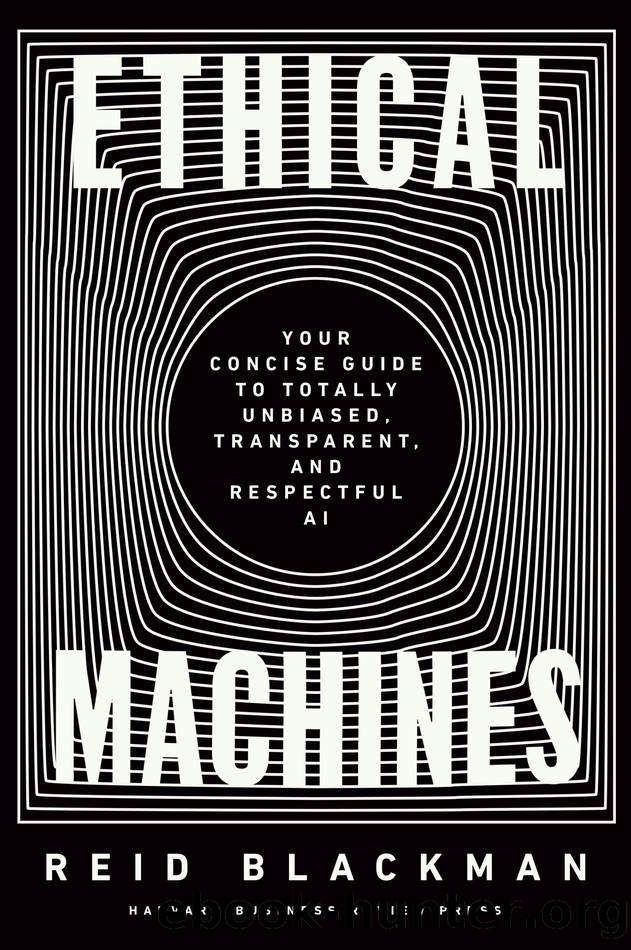Ethical Machines by Reid Blackman;

Author:Reid Blackman;
Language: eng
Format: epub
Publisher: Lightning Source Inc. (Tier 2)
Published: 2022-07-12T00:00:00+00:00
Building and Deploying with Five Ethical Levels of Privacy
The Five Ethical Levels of Privacy provide a way of assessing the degree of privacy respected by the product and, indirectly, the organization that created the product, which is good both for external stakeholders and for executives and managers charged with ensuring the organizational commitment to privacy is made real. It is also a tool by which developers can think about privacy as it is developed.
Suppose your product managers have a clear understanding of what your organizationâs commitment to privacy looks like, including what kinds of things it will always do and what kinds of things it will never do (an understanding it may arrive at from your AI Ethics Statement, which weâll discuss in detail in the next chapter). It may even include a commitment to never falling below level two of privacy, or a rabid commitment to level five.
A problem is presented to one of your AI teams, and they get to work brainstorming orâto use a âwordâ that, when used, should result in the loss of oneâs tongueâideating potential solutions. As they think about those solutions, they also think about what levels of privacy those proposed solutions are compatible with and how the proposed product fits into your organizationâs general privacy commitments. Some proposed solutionsâlike the one that secretly deploys facial-recognition technology so as to identify shoppers in the store so it can send discount codes for toilet paper, good for one hour, to their phonesâare rejected because the organization requires transparency with its customers. Other solutionsâlike the one that texts discount codes for toilet paper to preexisting customers based on when the AI predicts they probably need moreâare left on the table because those customers have already opted in to having that data collected for the purposes of receiving targeted discount codes, which reflects the organizationâs commitment to level four (since customers are opted out by default but they also wonât get discount codes without opting in).
In some cases, what level a company operates at is largely determined by its business model. In the case of Facebook, it might crumble if it stopped collecting user data unless people opted in while providing full services to everyone. Its revenue is driven through serving ads, and advertisers need user data so they can target them. Other businesses, for example, those that operate on a subscription model, can afford to reach level five.
Not all companies should strive for level five. Privacy, conceived of as the extent to which the people you collect data about and on whom you deploy your AI have knowledge and control over what data your organization collects and what it does with it, is something worth valuing. But it is not the only thing worth valuing, and there are cases in which it is reasonable to decrease the level of privacy you reach for the sake of some other (ethical) good that outweighs it. If, for instance, decreasing the level of privacy you reach is essential to,
Download
This site does not store any files on its server. We only index and link to content provided by other sites. Please contact the content providers to delete copyright contents if any and email us, we'll remove relevant links or contents immediately.
| Ethics | Etiquette |
| Fashion & Image | Health & Stress |
| Motivation & Self-Improvement | Work Life Balance |
| Workplace Culture |
Tools of Titans by Timothy Ferriss(8396)
Change Your Questions, Change Your Life by Marilee Adams(7783)
Deep Work by Cal Newport(7085)
Playing to Win_ How Strategy Really Works by A.G. Lafley & Roger L. Martin(6309)
Man-made Catastrophes and Risk Information Concealment by Dmitry Chernov & Didier Sornette(6019)
Big Magic: Creative Living Beyond Fear by Elizabeth Gilbert(5774)
Digital Minimalism by Cal Newport;(5765)
Ego Is the Enemy by Ryan Holiday(5450)
The Slight Edge by Jeff Olson(5418)
The Motivation Myth by Jeff Haden(5213)
The Laws of Human Nature by Robert Greene(5208)
Stone's Rules by Roger Stone(5088)
Tuesdays with Morrie by Mitch Albom(4784)
Eat That Frog! by Brian Tracy(4541)
Rising Strong by Brene Brown(4464)
Skin in the Game by Nassim Nicholas Taleb(4250)
The Money Culture by Michael Lewis(4207)
Bullshit Jobs by David Graeber(4192)
Skin in the Game: Hidden Asymmetries in Daily Life by Nassim Nicholas Taleb(4007)
